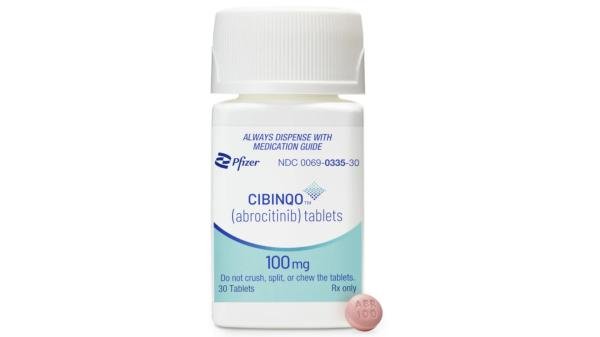Abrocitinib Disease Interactions
There are 6 disease interactions with abrocitinib.
- Cardiovascular disease
- Infections
- Malignancies
- Abrocitinib -thrombosis
- Liver dysfunction
- Renal dysfunction
Abrocitinib (applies to abrocitinib) cardiovascular disease
Major Potential Hazard, Moderate plausibility. Applicable conditions: Smoking, Heart Disease
Major adverse cardiovascular events such as cardiovascular death, myocardial infarction, and non-fatal stroke were observed in clinical studies with abrocitinib. Patients over 50 years old, current or past smokers, and patients with at least one cardiovascular risk factor were shown to have a higher risk. Consider the risks and benefits for each patient prior to initiating therapy with this drug, particularly in those that have cardiovascular risk factors including smoking.
References
- (2022) "Product Information. Cibinqo (abrocitinib)." Pfizer U.S. Pharmaceuticals Group
Abrocitinib (applies to abrocitinib) infections
Major Potential Hazard, Moderate plausibility. Applicable conditions: Infection - Bacterial/Fungal/Protozoal/Viral
Serious infections leading to hospitalization or death, including tuberculosis (TB) and bacterial, invasive fungal, viral, and other opportunistic infections, have occurred in patients receiving JAK inhibitors such as abrocitinib. Abrocitinib should be avoided in patients with active serious infections, including localized infections. Treatment with abrocitinib is not recommended in patients with active TB, or in patients with active hepatitis B or C, as viral reactivation has been reported. Consider the risks and benefits of treatment prior to initiating therapy in patients with chronic or recurrent infections, exposed to tuberculosis, with a history of opportunistic infections, or underlying conditions that predispose to infection. Caution and close monitoring for signs and symptoms of infection is recommended during treatment.
References
- (2022) "Product Information. Cibinqo (abrocitinib)." Pfizer U.S. Pharmaceuticals Group
Abrocitinib (applies to abrocitinib) malignancies
Major Potential Hazard, Moderate plausibility. Applicable conditions: Smoking, Neoplasia -- Estrogen Dependent, Lymphoma, Lung Cancer, History - Skin Cancer, Bladder Cancer
Malignancies, including lymphomas and lung cancers have been reported in patients receiving JAK inhibitors such as abrocitinib. Consider the benefits and risks for the individual patient prior to initiating or continuing therapy, particularly in patients with a known malignancy, and patients who are current or past smokers.
References
- (2022) "Product Information. Cibinqo (abrocitinib)." Pfizer U.S. Pharmaceuticals Group
Abrocitinib -thrombosis
Major Potential Hazard, Moderate plausibility. Applicable conditions: Cardiovascular Disease
Deep venous thrombosis (DVT) and pulmonary embolism (PE) were observed in patients receiving abrocitinib. Patients 50 years of age and older with at least one cardiovascular risk factor, had higher rates of overall thrombosis, DVT, and PE. Avoid abrocitinib in patients that may be at increased risk of thrombosis.
References
- (2022) "Product Information. Cibinqo (abrocitinib)." Pfizer U.S. Pharmaceuticals Group
Abrocitinib (applies to abrocitinib) liver dysfunction
Moderate Potential Hazard, Moderate plausibility. Applicable conditions: Liver Disease
Abrocitinib is not recommended for use in patients with severe hepatic impairment.
References
- (2022) "Product Information. Cibinqo (abrocitinib)." Pfizer U.S. Pharmaceuticals Group
Abrocitinib (applies to abrocitinib) renal dysfunction
Moderate Potential Hazard, Moderate plausibility.
Abrocitinib is not recommended for use in patients with severe renal impairment (eGFR less than 30 mL/min) and end-stage renal disease (eGFR less than 15 mL/min).
References
- (2022) "Product Information. Cibinqo (abrocitinib)." Pfizer U.S. Pharmaceuticals Group
Abrocitinib drug interactions
There are 548 drug interactions with abrocitinib.
Abrocitinib alcohol/food interactions
There is 1 alcohol/food interaction with abrocitinib.
More about abrocitinib
- abrocitinib consumer information
- Check interactions
- Compare alternatives
- Reviews (2)
- Side effects
- Dosage information
- During pregnancy
- Drug class: selective immunosuppressants
- Breastfeeding
- En español
Related treatment guides
Drug Interaction Classification
| Highly clinically significant. Avoid combinations; the risk of the interaction outweighs the benefit. | |
| Moderately clinically significant. Usually avoid combinations; use it only under special circumstances. | |
| Minimally clinically significant. Minimize risk; assess risk and consider an alternative drug, take steps to circumvent the interaction risk and/or institute a monitoring plan. | |
| No interaction information available. |
Further information
Always consult your healthcare provider to ensure the information displayed on this page applies to your personal circumstances.


